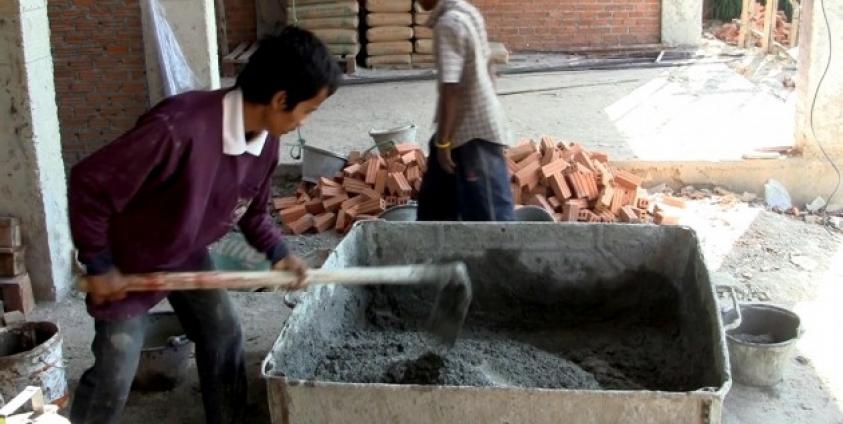The Burma government’s announced on August 25 that its National Minimum Wage Committee had approved a minimum daily wage of K3,600 (US$2.80) for a standard eight-hour work day across all industries. From 1st September the national minimum wage will apply and workers’ minimum monthly pay would be about $67 based on a six-day week.
The state-owned media reported that he new regulation was introduced following a survey of 22,000 households in 108 townships across the country by the National Minimum Wage Committee to determine average living costs of individual low-income workers.
Since then the committee had held several rounds of negotiations with the government, labour organisations, employers and workers.
The National Minimum Wage Committee said in a statement that the minimum wage would apply to all workers – except small and family-run businesses with a workforce comprising less than 15 people.
The local manufacturers’ association have documented that in 2014 at least one new garment factory opened every week in Burma and that orders from international companies had tripled export revenues in the clothing sector to $1.5bn in three years.
Karen News spoke to workers on the Thai-Burma border and inside the country to get their views on the basic minimum wage.
Ko Aung, 38, originally from Ayeyawaddy Delta, is now working as a daily laborer with the government construction department in Kawkareik.
“The rate may be good for workers in Yagon or Mandalay areas, but for workers in the States, its a joke. In Kawkareik, working as a hard laborer, men will only do it if they are paid 4,500 Kyat or 5,000 Kyat a day. Women get paid 4,000 to 4,500 Kyat a day here.”
Ko Aung explained to Karen News that the [government’s] minimum wage is not enough.
“It will not be enough to cover the costs for a single individual in this area for their daily living cost –it’s even worse for people with family. A meal cost 1,500 Kyat and two meals is already 3,000 Kyat – the remaining 600 Kyat will not cover other expenses.”
Su Su Khaing, a garment factory worker in the Thai border town of Mae Sot told Karen News what she thought of the minimum wage.
“The rate of 3,600 Kyat is not very much and I wouldn’t work if I got paid at that rate. It might be okay for people in the country [Burma] who can work every day. If you can’t get the work every day, I think it will not be enough to cover your living costs.”
Su Su Khaing said the new wage would not entice her to go back to Burma.
” I don’t think I will be going back because I am doing quite well here. I can send money home and I still have enough to spend on things I need.”
Su Su Khaing told Karen News she would be staying in Thailand, as the cost of living was cheaper and the wages higher.
It is estimated by international labour groups that Thailand has as many as three million Burmese migrant workers and it has set a basic wage of 300 Baht (US $10) a day. Many Burmese workers, especially does who are undocumented do not get paid that rate, but they still say they can earn much more in Thailand than in Burma.
“If I compare the situation in Burma and Thailand, I think it is still better here – I don’t mean to talk bad about our country or government. The value of the money is also better here. The price of things here in Thailand might seems expensive compare to Kyat but what you earn and what you spend is still better.”
Su Su Khaing said foodstuff was around half the price of those in Burma.
“You can buy snacks for five or ten baht [150 or 300 Kyat] but in Burma prices start from 500 or 1,000 Kyat. So, for now I am not ready to go back yet. As Burma is our home, for sure one day I will go back but not for now as I can make better money out here.”
Ah Nge Lay, a factory worker in Mae Sot, who is from the Rangoon area told Karen News that he agrees with Su Su Khaing.
“If the new daily rate is 3,600 kyat you would earn a little more than 100,000 Kyat[$100] a month. I used to earn 105,000 Kyat a month back there and that was not enough so I came and worked here [in Thailand]. I now earn 6,000 baht [$200] a month here and I can spend it as I like, and I can still send money to my parents – 100,000 kyat a month. I don’t think I am going back for now.”
Ah Nge Lay told Karen News that the minimum wage is no different than what he was getting before he left Burma.
“When I was back in Burma, I earned almost the rate what the government has now set as minimum wage and that was not enough for me and for my family to live on.”
Ah Nge Lay, like the other workers interviewed for this story agreed that if wages improve to a level that they can live on they would go home.
“I hope that the rate will increase in the future and then I would go back. I know I won’t live forever here. Burma is our birth place and I will go back, but just not for now.”








